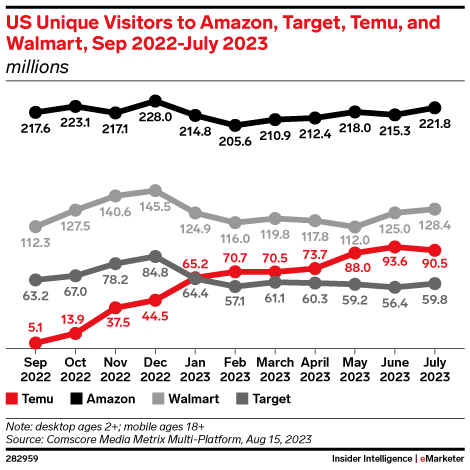Industries Overview
Our research focuses on the five core coverage areas below. We apply our rigorous research methodology to our reports, charts, forecasts, and more to keep our clients at the forefront of key developments and trends before they hit the mainstream.
Latest Articles
Browse All →US student loan forgiveness will give 73,000 US consumers extra cash—and they’ll want help saving and investing it
Article |
Jan 24, 2024
Third-party intermediaries haven’t caught up with grocers
Article |
Jan 24, 2024
2023 was a strong year for Netflix. With the WWE, the future looks even brighter.
Article |
Jan 24, 2024
5 factors driving the growth of beauty and cosmetics sales
Article |
Jan 24, 2024
Shoppers want AI to help with product research and customer service
Article |
Jan 23, 2024
US ad agencies approach 2024 with a mix of optimism and economic caution
Article |
Jan 23, 2024
5 charts showing the potential of text message (SMS) marketing
Article |
Jan 23, 2024
84.51° exec: Consumers remain concerned with inflation and retailers must balance digital and physical for success in 2024
Article |
Jan 23, 2024
Cookie deprecation won’t change advertisers’ preferred transaction methods
Article |
Jan 23, 2024
Walmart’s lackluster protection of financial services customers raises questions about unregulated nonbanks
Article |
Jan 22, 2024
Products
Insider Intelligence delivers leading-edge research to clients in a variety of forms, including full-length reports and data visualizations to equip you with actionable takeaways for better business decisions.
Forecasts
Interactive projections with 10k+ metrics on market trends, & consumer behavior.
Learn More →Charts
Proprietary data and over 3,000 third-party sources about the most important topics.
Learn More →Industry KPIs
Industry benchmarks for the most important KPIs in digital marketing, advertising, retail and ecommerce.
Learn More →About Insider Intelligence
Our goal at Insider Intelligence is to unlock digital opportunities for our clients with the world’s most trusted forecasts, analysis, and benchmarks. Spanning five core coverage areas and dozens of industries, our research on digital transformation is exhaustive.
Methodology
Rigorous proprietary data vetting strips biases and produces superior insights.
Learn More →Events
Browse our upcoming and past events, recent podcasts, and other featured resources.
Learn More →Walmart’s lackluster protection of financial services customers raises questions about unregulated nonbanks
Insider Intelligence
Media Services
Free Content
Contact Us →
Worldwide HQ
One Liberty Plaza9th FloorNew York, NY 100061-800-405-0844
Sales Inquiries
1-800-405-0844ii-sales@insiderintelligence.com
* Copyright © 2024
Insider Intelligence Inc. All Rights Reserved.
